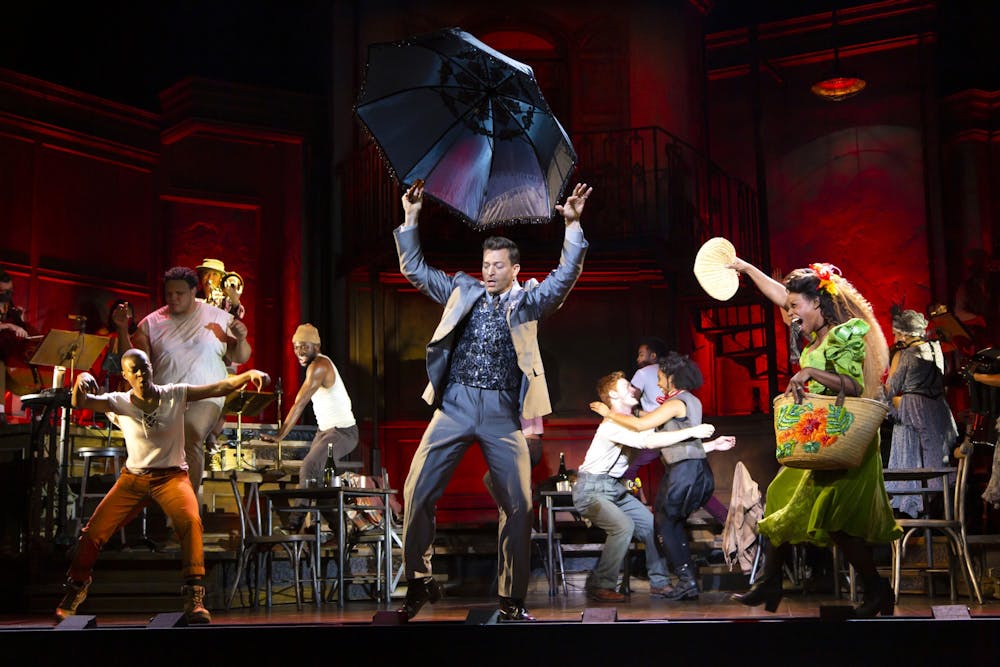"Hadestown" gives you the world — for all it is and could be — only to rip it away, leaving you on your knees begging for more, even willing to sell your soul.
There are few experiences like it and anyone who is lucky enough to sit in the audience should treat the experience like a gift from the gods.
Based on the Greek myth of Orpheus and Eurydice, the show mixes one of the great Western tragedies with Americana folk and New Orleans-style jazz music, inviting you into an eclectic yet perfectly crafted aesthetic.
For those not caught up on their classics, in the myth, Orpheus (Nicholas Barasch) is a musician who falls in love with Eurydice (Morgan Siobhan Green), a young woman down on her luck. In a terrible twist of fate, Eurydice dies and is taken to the Underworld, and Orpheus makes it his mission to follow her to the Land of the Dead and convince Hades (Kevyn Morrow) to release her.
This version of the story takes the ancient tragedy and incorporates the myth of Hades and Persephone (Kimberly Marable), whose love has cooled after centuries of marriage, as a foil to the young lovers. As gods, the distance between them throws the world out of balance, causing the summers to get hotter and the winters colder, a divine form of climate change.
That imbalance is the spark for the entire plot, pushing Eurydice to leave Orpheus and the cold for the Underworld — known as Hadestown — where Hades promises she won’t go hungry or cold again, but only because she signs her life away and will never feel such human needs again.
“Hadestown” originally premiered in 2006 in Vermont, before writer Anaïs Mitchell turned it into a concept album in 2010. It only returned to the stage after director Rachel Chavkin joined the project, bringing it Off-Broadway in 2016, moving to Edmonton and London before finally premiering on Broadway in March 2019.
The Broadway production was nominated for 14 Tony Awards in 2019, winning eight, including Best Original Score and Best Musical.
In the same way the show hinges on two loves, there are two central themes: climate change and class struggle. In nearly every appearance of Orpheus, we are reminded that he’s a poor boy, with little to his name besides a lyre and his voice. Hades, on the other hand, has turned the Underworld into a kingdom of industry, filled with factories, mines, crucibles and lights, growing wealthy as a result.
It is no mistake this version of hell is a factory and Hades the foreman. The ensemble is instead the workers (Lindsey Hailes, Chibueze Ihuoma, Will Mann, Ian Coulter-Buford, Sydney Parra and Alex Lugo), those who gave up their lives above ground to fashion things of steel for Hades.
No song makes this conflict clearer than “If it’s True,” where Orpheus sings what starts as a lament after learning that Eurydice is stuck in Hadestown, and he believes his journey was pointless. But as he turns to leave, he begins to question the power structure.
“If it's true what they say / I’ll be on my way / But who are they to say what the truth is anyway?”
He begins to see the lies he has been forced to believe by the powerful and begins to stand up for the woman he loves, all the while inspiring the workers to see through the propaganda they’ve been fed and begin organizing.
This sort of radical politics is extremely rare to find on or off Broadway, even more so in a show mainstream enough to begin touring nationally. It is refreshing, after years of self-congratulatory liberal lines found in shows like “Hamilton: An American Musical.”
Moments like “Immigrants: We get the job done” would attract a wave of applause, but they felt empty when encased in a romanticization of the U.S. and its portrayal of a post-racial America today.
“Hadestown” goes further than any mainstream musical in promoting a strong critique of capitalism, linking it to climate change and promoting strong leftist ideals, like in “Livin’ it Up on Top” when Orpheus gives a toast to Persephone for providing them their food and drinks.
“Asking nothing in return except that we should live / And learn to live as brothers in this life / And to trust she will provide / And if no one takes too much / There will always be enough.”
Broadway has long had difficulty attracting or including anyone who isn't part of the upper crust, but "Hadestown" may finally invite the average American into the theater with a story as old as theater itself.
As we're told countless times throughout the show, "it's an old song from way back when / and we're gonna sing it again and again."
"Hadestown" plays at Gammage April 19-24, with tickets ranging from $75-$350.
Reach the reporter at rknappen@asu.edu and follow @Ryan_Knappy on Twitter.
Like The State Press on Facebook and follow @statepress on Twitter.




